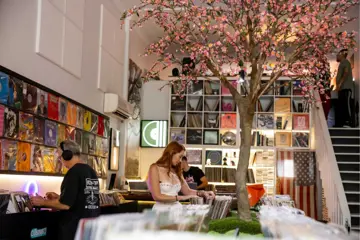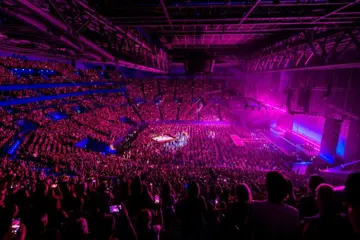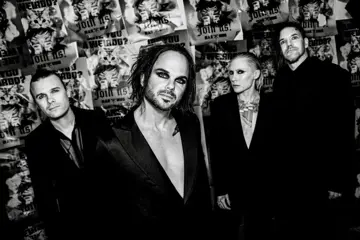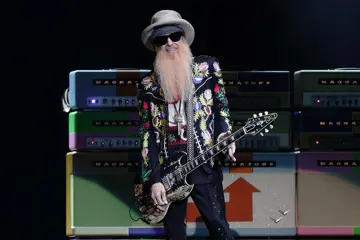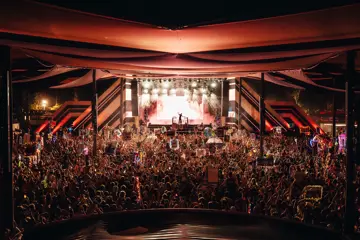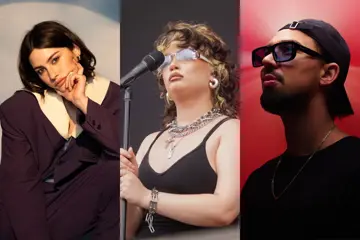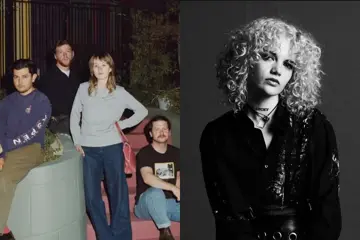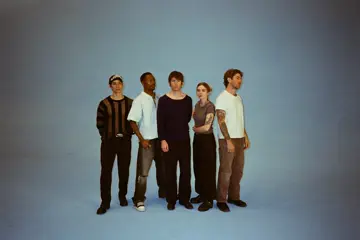He's presented a radio show on PBS for so long now that Stani Goma, who hosts Flight 1067 To Africa, confesses, "I've lost count," before offering, "Certainly my first show was in 1992". After "helping out as a volunteer" and filling in "a couple of times" when broadcasters went away, Goma eventually scored his own show. "The rest is history, as they say."
It was all in the timing and Goma believes "the very specialised nature" of Flight 1067 To Africa meant he didn't have to wait too long for a slot in the program guide. "It certainly came at a good time for me," he remembers, "because even though I wasn't collecting a lot of music back then, I knew a great deal about the music and I was very passionate about that particular type of music."
When asked how he sources music to play on Flight 1067 To Africa, Goma shares, "Back in the early '90s, the internet wasn't really an option. It was just a matter of, you know, what I owned and what PBS had and so on. And also I had arranged for the local record shops - they were happy to support the show by lending me music. But largely, yeah! It's just been, really, what I own and what I get from the internet, and occasionally what people send me." He also still buys music: "I mean, I go to record shops all the time and I'm a regular visitor to the record fairs when I can."
Given that Africa is comprised of 54 countries, Goma stresses, "The show tries to showcase the music of every corner of the continent and so - by definition, I mean - I really do need to have a lot of that music because otherwise I can't do justice to it."
Don't miss a beat with our FREE daily newsletter
Goma says he travels to Africa "about once a year or once every second year". "A few years ago we, um, through the show, through the station - we actually took a group of people to Africa," he reveals. A group of "between 15 and 20 people" formed the PBS travelling party and Goma elaborates, "Listeners came, and people that had an interest in going to Africa and experiencing the music - where it all comes from... I was the only presenter; the others were people that listen to the show and people that just wanted to come along. And they had to pay, obviously." Goma explains this trip "was very much about giving people the opportunity to see African music in its own context".
PBS have since organised a Blues Tour and a Reggae Tour "but the African tour was the first tour that PBS ever organised", Goma divulges. "We went and saw some live music communities and did a safari as well," he recalls. "So it was over three weeks, roughly, and it was great!"
He describes his involvement with PBS as "a wonderful journey". "Recently I started a new segment where I actually bring together musicians from different parts of Africa to come and do a live set; just a couple of musicians doing a live acoustic set on the show for about 15 minutes," Goma enthuses. "It's been going really well and we only started that, uh, about five weeks ago... [It's] bringing people together that would normally not work together, or meet, to come and play together.
"Last week for example, last Sunday, one musician from Tanzania came and the other one [was] from Seychelles, yeah! They were there 20 minutes before [airtime] and, you know, it was great... They just played the most amazing set without even rehearsing for a long time."
Because African music is collated geographically rather than being a term used to describe "one specific genre", Goma points out, "The music is changing all the time, like, young musicians are playing a very interesting style of music that is quite different to, you know, what older people play. So there's always that distinction between that more traditional sound and then a more, sort of, modern and futuristic sound as well. And there's a very interesting experimentation happening in Africa at the moment so, yeah! I mean, every time I go I find something new and something different; something I haven't heard before. And that's why trying to go every year is actually quite critical in keeping up with what's going on over there."
Over the years, Goma has noticed "a big difference in terms of the amount of music coming out of Africa and also the quality of music coming out of Africa", which he directly relates to artists being able to "produce their own music in a home studio". "The means of making music and recording music have become more accessible," he observes. "Every time I go [to Africa], there is a lot more music. In fact, if anything, for the first time in the last I'd say, ooh, probably two or three trips that I've made to Africa, now I've got more music than I can actually play! Whereas, you know, ten, 15 years ago - or maybe not that long - it was a lot more difficult to maintain our weekly show. But now, if anything, I've got more music than I can play."
According to Goma, "Community radio, and specifically PBS, is vital because PBS has, for as long as I have lived in Melbourne, always had a platform or a stage for African music... No other radio station - well, no mainstream radio in Australia - has done that for African music."
As volunteers, PBS broadcasters "do it for the love of it" and, on his commitment to Flight 1067 To Africa, Goma enthuses, "I do it because that's the music I grew up with, that's my heartbeat. And I want to share it with as many people as possible."
As well as raising much-needed funds to keep the station afloat, Goma sees PBS Radio Festival "as a celebration of what PBS is". The subscription drive also gives subscribers an opportunity to contribute "to the life of the station". "I also think PBS is contributing to the culture of Melbourne," Goma praises on the "diversity" of programs hosted by the station. Without community radio, Goma acknowledges there would be "definitely very limited interest in African music in Melbourne and Australia generally". "It's always good to have somebody who knows about that music to actually help you get a sense, you know? To help you navigate."
What: Take The Plunge: PBS Radio Festival 2016
When: Running until 29 May

